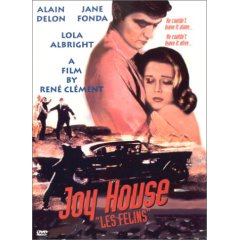 CHARMING CHANTEUSE
CHARMING CHANTEUSEI've been watching nothing but '60s French film and pop stars this week. On my birthday, my Francophile (and Francophone) friend Scott Wallace Brown graced me with a wonderful 1966 Francoise Hardy French TV special (merci Scottie!) that also featured appearances by the Yeh-Yeh chanteuse's madcap husband Jacques Dutronc, an insanely good-looking (like a cross between Jean-Claude Belmondo and Ray Davies) and charming French pop singer in his own right. Francoise is best known for her somber Yeh-Yeh ballad "Tous les Garcons et les Filles" but her best tunes appear near the end of the hour-long program as she belts out "Je Changerais d'Avis" and "Ce Petite Coeur." Francoise was at her peak of popularity in 1966, when every American or English rock star (Mick Jagger, Bob Dylan, etc.) visiting France tried to get an audience with her as if she was the Pope of Pop. And her boyfriend - and later husband - Jacques Dutronc was tres cool as well. As Scott Wallace Brown observed, he not only looked a little like Kinks frontman Ray Davies, his music sounded like Davies' as well, alternating between hard guitar-propelled rockers and light-hearted music hall whimsy.
GALLIC GANGSTAS
 Then today my film buff friend Bill friend gave me an English-dub copy of a 1969 French gangster film called The Sicilian Clan (Les Clan des Siciliens). The film stars two tough guy icons of French cinema from two very different generations, Jean Gabin and Alain Delon, and is currently out of print. When I looked up the director, Henri Verneuil, on imdb, I realized that I had another great French crime heist movie by him, 1963's Melodie en Sous-Sol (aka Any Number Can Win and The Big Grab), which is also out of print (Porquoi?). The 1963 film also paired Gabin with Delon and had a similar theme in that Gabin's character is also an aging crook who is just one caper away from retirement - and who really doesn't need to go through with the risk , yet is still drawn to the thrill of crime like an Enron accountant to cooked books. Or, as Gabin says to his wife in The Sicilian Clan when she asks why he isn't ready to retire and sit back in the rocking chair in their Sicilian crib, "Are you in such a hurry to die?"
Then today my film buff friend Bill friend gave me an English-dub copy of a 1969 French gangster film called The Sicilian Clan (Les Clan des Siciliens). The film stars two tough guy icons of French cinema from two very different generations, Jean Gabin and Alain Delon, and is currently out of print. When I looked up the director, Henri Verneuil, on imdb, I realized that I had another great French crime heist movie by him, 1963's Melodie en Sous-Sol (aka Any Number Can Win and The Big Grab), which is also out of print (Porquoi?). The 1963 film also paired Gabin with Delon and had a similar theme in that Gabin's character is also an aging crook who is just one caper away from retirement - and who really doesn't need to go through with the risk , yet is still drawn to the thrill of crime like an Enron accountant to cooked books. Or, as Gabin says to his wife in The Sicilian Clan when she asks why he isn't ready to retire and sit back in the rocking chair in their Sicilian crib, "Are you in such a hurry to die?" I actually preferred Melodie en Sous-Sol (which I think translates literally as "Basement Melody"), as it's a great casino heist film similar in theme to Lewis Milestone's 1960 Rat Pack outing Ocean's Eleven, but with a more noir style and a French Riviera setting in place of Las Vegas. But I will add that The Sicilian Clan boasts another great Spaghetti Western soundtrack by Ennio Morricone (even reprising the mouth-harp used so effectively in Sergio Leone's 1968 masterpiece Once Upon A Time in the West).
I actually preferred Melodie en Sous-Sol (which I think translates literally as "Basement Melody"), as it's a great casino heist film similar in theme to Lewis Milestone's 1960 Rat Pack outing Ocean's Eleven, but with a more noir style and a French Riviera setting in place of Las Vegas. But I will add that The Sicilian Clan boasts another great Spaghetti Western soundtrack by Ennio Morricone (even reprising the mouth-harp used so effectively in Sergio Leone's 1968 masterpiece Once Upon A Time in the West).While enjoyable, Verneuil's gangster films are not in the same class as Jean-Pierre Melville's gallic gangster "crime procedural" masterpieces like Le Samourai, Bob Le Flambeur and Le Cercle Rouge, though the latter certainly has a lot in common with The Sicilian Clan - both films open with a convict's dramatic escape from police custody and involve an elaborate jewel heist (though Melville would be hard-pressed to top the excitement of The Sicilian Clan's post-heist getaway in which a hijacked airplane lands on a highway!) Verneuil sets himself apart from Melville in that there's always room in Verneil's crime films for women (such as Carla Marlier, who plays the Swedish dancer seduced by Delon in Melodie en Sous-Sol's "romantic" subplot) whereas Melville's is mostly an all-garcons affair with women merely another obstacle (and potential entanglement) in the way of Men At Work. Still, both directors seem to enjoy the mechanics of crime, spending a lot of screen time on the process of planning and carrying out their Perp Procedurals, and both share an existential worldview in which we know the bad guys will at best be busted and at worst lose their lives. Their characters seem to sense this as well, yet are resigned to the fact that the thrill of life is in the living-on-the-edge carpe diem moments like this rather than the dull monotony of daily existence in the normal, law-abiding world. "The play's the thing," according to Shakespeare. For Verneuil and Melville, "The crime's the thing." We are but players strutting on life's stage - or criminals crafting a tragic caper on it.
 DISAPPEARING DELONS
DISAPPEARING DELONSIt's unfortunate that so many great Alain Delon French crime films are no longer available on video or DVD. Besides The Sicilian Clan and Melodie en Sous-Sol, another Delon title currently unavailable is Rene Clement's 1964 sexy thriller Les Felins (Joy House), which co-starred a young 26-year-old Jane Fonda (I love this period in Fonda's career, highlighted by roles like this and her debut as a husband-hunting co-ed in 1960's Tall Story and as a White Trash southern goodtime gal in 1962's Walk On the Wild Side), had a great soundtrack by Lalo Schifrin, and once again placed Delon on the French Riviera - this time as a playboy hustler on the run from American thugs who want to murder him for messing around with an associate’s wife. He takes shelter from the thugs in a church in Nice. There he meets the beautiful widow, Barbara (Lola Albright) and her seemingly innocent young cousin, Melinda (Fonda). The testosterone-teasing twosome invite Delon back to their villa to work as their chauffeur ("Baby You Can Drive My Car" had not been written yet but would have been a great addition to the soundtrack) and as the third point in an emerging love triangle - one that has a very clever twist ending. Delon is quite effective as a cad, a role that matched his real-life persona (cavalierly abandoning the child he had with the similarly irresponsible Velvet Underground singer Nico - the child eventually being raised by Delon's mother, as documented in the 1995 documentary film Nico Icon).
Oh well. Let's hope that all these titles become available sometime soon on DVD. In the meantime, I'll content myself with watching some more Francoise Hardy.
No comments:
Post a Comment